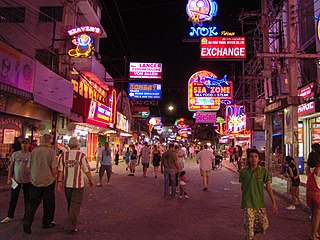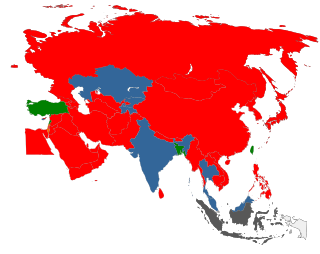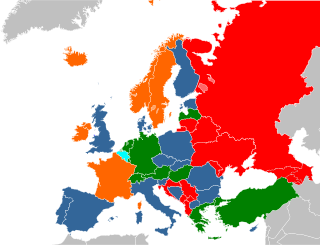Related Research Articles

Sexual slavery and sexual exploitation is an attachment of any ownership right over one or more people with the intent of coercing or otherwise forcing them to engage in sexual activities. This includes forced labor, reducing a person to a servile status and sex trafficking persons, such as the sexual trafficking of children.

Child prostitution is prostitution involving a child, and it is a form of commercial sexual exploitation of children. The term normally refers to prostitution of a minor, or person under the legal age of consent. In most jurisdictions, child prostitution is illegal as part of general prohibition on prostitution.

Prostitution in Thailand is in itself illegal, but many of the activities associated with it are illegal. Because of police corruption and an economic reliance on prostitution dating back to the Vietnam War, it remains a significant presence in the country. It results from poverty, low levels of education and a lack of employment in rural areas. Prostitutes mostly come from the northeastern Isan region of Thailand, from ethnic minorities or from neighbouring countries, especially Myanmar and Laos. UNAIDS in 2019 estimated the total population of sex workers in Thailand to be 43,000.

Sex trafficking is human trafficking for the purpose of sexual exploitation. It has been called a form of modern slavery because of the way victims are forced into sexual acts non-consensually, in a form of sexual slavery. Perpetrators of the crime are called sex traffickers or pimps—people who manipulate victims to engage in various forms of commercial sex with paying customers. Sex traffickers use force, fraud, and coercion as they recruit, transport, and provide their victims as prostitutes. Sometimes victims are brought into a situation of dependency on their trafficker(s), financially or emotionally. Every aspect of sex trafficking is considered a crime, from acquisition to transportation and exploitation of victims. This includes any sexual exploitation of adults or minors, including child sex tourism (CST) and domestic minor sex trafficking (DMST).
Prostitution in Russia is illegal. The punishment for engagement in prostitution is a fine from 1500 up to 2000 rubles. Moreover, organizing prostitution is punishable by a prison term. Prostitution remains a very serious social issue in Russia.

The legality of prostitution in Asia varies by country. There is often a significant difference in Asia between prostitution laws and the practice of prostitution. In 2011, the Asian Commission on AIDS estimated there were 10 million sex workers in Asia and 75 million male customers.
Prostitution in Greece is legal at the age of 18, and regulated. It is estimated that fewer than 1,000 women are legally employed as prostitutes and approximately 20,000 women, half of whom are of foreign origin and the other half are Greek, are engaged in illegal prostitution. Many women affected by the economic crisis have turned to prostitution through poverty.
Prostitution in the State of Palestine is illegal, under Palestinian law. Ramallah has prostitution, but long-term abstinence is common, as premarital sex is seen as taboo in the territories.

The legality of prostitution in Europe varies by country.

There exists a diversity of feminist views on prostitution. Many of these positions can be loosely arranged into an overarching standpoint that is generally either critical or supportive of prostitution and sex work. The discourse surrounding prostitution is often discussed assuming sex workers are women, but those in the field of sex work and prostitution are not always women.
Human trafficking in Canada is prohibited by law, and is considered a criminal offence whether it occurs entirely within Canada or involves the "transporting of persons across Canadian borders. Public Safety Canada (PSC) defines human trafficking as "the recruitment, transportation, harbouring and/or exercising control, direction or influence over the movements of a person in order to exploit that person, typically through sexual exploitation or forced labour. It is often described as a modern form of slavery."

Prostitution laws varies widely from country to country, and between jurisdictions within a country. At one extreme, prostitution or sex work is legal in some places and regarded as a profession, while at the other extreme, it is a crime punishable by death in some other places.

India has a very high volume of child trafficking. As many as one child disappears every eight minutes, according to the National Crime Records Bureau. In some cases, children are taken from their homes to be bought and sold in the market. In other cases, children are tricked into the hands of traffickers by being presented an opportunity for a job, when in reality, upon arrival they become enslaved. In India, there are many children trafficked for various reasons such as labor, begging, and sexual exploitation. Because of the nature of this crime; it is hard to track; and due to the poor enforcement of laws, it is difficult to prevent. Due to the nature of this crime, it is only possible to have estimates of figures regarding the issue. India is a prime area for child trafficking to occur, as many of those trafficked are from, travel through or destined to go to India. Though most of the trafficking occurs within the country, there is also a significant number of children trafficked from Nepal and Bangladesh. There are many different causes that lead to child trafficking, with the primary reasons being poverty, weak law enforcement, and a lack of good quality public education. The traffickers that take advantage of children can be from another area in India, or could even know the child personally. Children who return home after being trafficked often face shame in their communities, rather than being welcomed home.
Afghanistan is one of the source, transit, and destination country for men, women, and children who are subjected to trafficking in persons, specifically forced labor and forced prostitution. Trafficking within Afghanistan is more prevalent than transnational trafficking, and the majority of victims are children. In 2005 the Afghan Independent Human Rights Commission (AIHRC) reported 150 child trafficking cases to other states. Afghan boys and girls are trafficked within the country and into Iran, Pakistan and India as well as Persian gulf Arab states, where they live as slaves and are forced to prostitution and forced labor in brick kilns, carpet-making factories, and domestic service. In some cases the boys and girls were used for organ trafficking. Forced begging is a growing problem in Afghanistan; Mafia groups organize professional begging rings. Afghan boys are subjected to forced prostitution and forced labor in the drug smuggling industry in Pakistan and Iran. Afghan women and girls are subjected to forced prostitution, arranged and forced marriages—including those in which husbands force their wives into prostitution—and involuntary domestic servitude in Pakistan and Iran, and possibly India. Non-governmental organizations (NGOs) report that over the past year, increasing numbers of boys were trafficked internally. Some families knowingly sell their children for forced prostitution, including for bacha bazi - a practice combining sexual slavery and child prostitution, through which wealthy men use harems of young boys for social and sexual entertainment. Other families send their children with brokers to gain employment. Many of these children end up in forced labor, particularly in Pakistani carpet factories. NGOs indicate that families sometimes make cost-benefit analyses regarding how much debt they can incur based on their tradable family members.
Celia Williamson is an American University of Toledo Distinguished Professor of Social Work and Executive Director of the Human Trafficking and Social Justice Institute, as well as researcher and community advocate who seeks to combat domestic human trafficking and prostitution. She was named the 26th most influential social worker alive today.
Crime is present in various forms in Sri Lanka. Crime is segmented into two broad classifications: grave crimes and minor crimes. Exceptions can be made for criminal liability on the grounds of duress, insanity, intoxication, necessity, and private defense. Punishment for crime includes several options: community service, fine, forfeiture of property, imprisonment, institutional treatment, probation, suspended sentence, and death; while the death penalty is available in the country, there have been no executions since 1976. Corporal punishments (whipping) has been abolished as of 2005.
SAWA is a Palestinian, non-profit civil society organization established in 1998 by a group of female volunteers active in women's issues.

Slavery is a system which requires workers to work against their will for little to no compensation. In modern-day terms, this practice is more widely referred to as human trafficking. Human trafficking is defined by the United Nations Office on Drugs and Crime as “the recruitment, transportation, transfer, harboring or receipt of persons, by means of the threat or use of force or other forms of coercion, of abduction, of fraud, of deception, of the abuse of power or of a position of vulnerability or of the giving or receiving of payments or benefits to achieve the consent of a person having control over another person, for the purpose of exploitation”. The practices of slavery and human trafficking are still prevalent in modern America with estimated 17,500 foreign nationals and 400,000 Americans being trafficked into and within the United States every year with 80% of those being women and children. Human trafficking in the United States can be divided into the two major categories of labor and sex trafficking, with sex trafficking accounting for a majority of cases.

Sex trafficking in the United States is a form of human trafficking which involves reproductive slavery or commercial sexual exploitation as it occurs in the United States. Sex trafficking includes the transportation of persons by means of coercion, deception and/or force into exploitative and slavery-like conditions. It is commonly associated with organized crime.

Crime in the State of Palestine is present in various forms which include theft, drug trafficking, arms trafficking, burglary, human trafficking and terrorism.
References
- 1 2 "Report lifts veil on trafficking, prostitution of Palestinian women". CNN . CNN.com. 2009. Retrieved 2014-04-13.
{{cite web}}: CS1 maint: url-status (link) - ↑ "Trafficking and Forced Prostitution of Palestinian Women and Girls: Forms of Modern Day Slavery; PDF" (PDF). Archived from the original (PDF) on 2013-06-01. Retrieved 2014-04-13.
- ↑ A Human Rights Report on Trafficking in Persons, Especially Women and Children, PDF Archived 2017-01-10 at the Wayback Machine